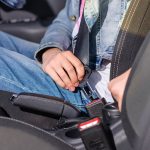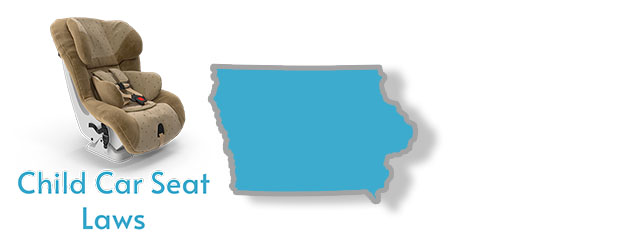A Summary of Child Car Seat Laws in Iowa
What are the Height and Weight Requirements for Car Seats in Iowa?

Iowa requires infants under 1 year old who weigh LESS than 20 pounds to ride on rear-facing seats.
The Iowa Child Restraint Law does not issue specific requirements for forward-facing seats.
According to experts, most children exceed or outgrow the rear-facing seat requirements before age 4.
Children can graduate to a booster seat once they exceed the forward-facing car seat weight and height requirements.
What are the Rear Facing Car Seat Laws in Iowa?

Iowa car seat law requires infants under 1 year old who weigh less than 20 pounds to ride on rear-facing seats. However, the AAP (American Academy of Pediatrics) encourages parents to keep their babies in rear-facing seats until they are 2 years old or when the maximum weight (can be up to 40 pounds) and height requirements of the seat have been exceeded.
This type of seat offers the most protection since most of the impact is absorbed by the back of the seat. As a result, the baby’s fragile body parts (head, neck, and spine) are protected from potential injury. The seat should be secured in the back seat and nowhere near a functional airbag.
What are the Forward Facing Car Seat Laws in Iowa?

The Iowa Child Restraint Law does not issue specific requirements for forward-facing seats. However, the Iowa Governor’s Traffic Safety Bureau guidelines state that parents can transition their children to a forward-facing seat once they are 1 year or older and weigh 20-40 pounds.
According to experts, most children exceed or outgrow the rear-facing seat requirements at age 4, and they may be within the forward-facing limits until age 8. This means the appropriate age and weight for this seat are between 4-8 years and 40 pounds.
Your child should be secured in this seat with a 5 point harness with the straps crossing the chest and thigh areas. It is also considered safe to secure a forward-facing seat with only a lap belt in case you don’t have a seat with shoulder belts.
Currently, most seats of these type support children of up to 65 pounds, so your child should remain in this seat until he or she exceeds this weight or the manufacturer’s height and weight limits. The seat should always be secured in the back seat and away from an active airbag.
What are the Booster Seat Laws in Iowa?

The use of booster seats is recommended by the state of Iowa, however, the specific age and weight requirements are not stated in any law.
Children can graduate to a booster seat once they exceed the forward-facing car seat weight and height requirements set by the manufacturer. Typically, this happens at age 8, and the kids may be within the booster seat limits until age 12.
A guide by the Iowa Governor’s Traffic Safety Bureau says children can switch to booster seats once they attain a weight of 40 pounds or more and remain there until they attain a height of 4’9’’ or weight of 80 pounds, whichever comes first. However, experts recommend focusing on the height since seatbelts were designed to fit an average adult with a height of 4’9’’ or more.
Never use a booster seat with lap belts only. The safest way is to secure your child on a booster seat together with shoulder belts and lap belts. Ensure the lap belt fits low and tight across the thighs (not stomach), and the shoulder belt snugly crosses the chest area.
When Can a Child Use the Front Seat in Iowa?

Iowa law requires children age 6 and below to be secured on a child restraint system that is placed in the back seat. This means children older than 6 years can legally sit anywhere (except the driver’s seat) in the car as long as they are secured in the back seat. However, the AAP says the back seat is safest for your child, and the appropriate age for the front seat is age 13. This is because airbags are designed for adults and can injure your child in case of an accident.
All children under the age of 18 are required to use either the appropriate child restraint system or a safety belt.
Is it Illegal to Leave a Child Alone Inside a Vehicle in Iowa?
No law in Iowa covers situations where a child is left unsupervised in a car. However, the state has a child endangerment law that may apply if you expose your child to injury or harm of any other kind. We do not recommend that you leave your child alone in a vehicle for any length of time.
Are Car Seats Required in Taxis?

Children are exempted from complying with the Iowa car seat law if they have been certified by a physician as having a medical condition, or a disability that makes the use of child restraint systems inappropriate. Commercial vehicles such as taxis are not required to implement the state’s car seat laws.
However, parents are required to bear responsibility when transporting their children. Therefore, in case of a violation, the parent will be charged instead of the taxi driver. Also, children being transported in vehicles manufactured before 1966 are exempted.
